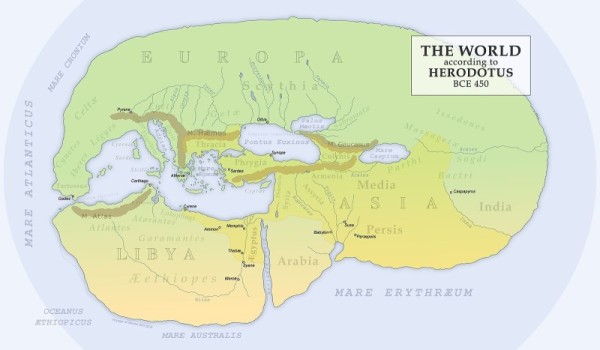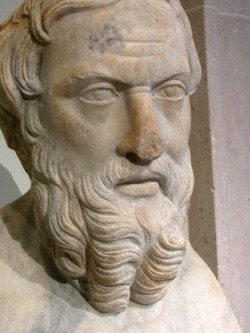Then as they were suffering hardship for a long time and many were falling on both sides, and especially on that of the Persians, Amasis the commander of the land-army contrived as follows:

Translated by George C. Macaulay — our special project presenting the complete Herodotus with URLs for all of those people, places, events, and things which baffles and discourages modern readers.
Previously on Herodotus
199. Moreover the land of Kyrene, which is the highest land of the part of Libya which is occupied by nomads, has within its confines three seasons of harvest, at which we may marvel: for the parts by the sea-coasts first have their fruits ripe for reaping and for gathering the vintage; and when these have been gathered in, the parts which lie above the sea-side places, those situated in the middle, which they call the hills, are ripe for the gathering in; and as soon as this middle crop has been gathered in, that in the highest part of the land comes to perfection and is ripe; so that by the time the first crop has been eaten and drunk up, the last is just coming in. Thus the harvest for the Kyrenians lasts eight months. Let so much as has been said suffice for these things.
200. Now when the Persian helpers of Pheretime, having been sent from Egypt by Aryandes, had arrived at Barca, they laid siege to the city, proposing to the inhabitants that they should give up those who were guilty of the murder of Arkesilaos: but as all their people had taken a share in the guilt, they did not accept the proposals. Then they besieged Barca for nine months, both digging underground passages which led to the wall and making vigorous attacks upon it. Now the passages dug were discovered by a worker of bronze with a shield covered over with bronze, who had thought of a plan as follows: carrying it round within the wall he applied it to the ground in the city, and whereas the other places to which he applied it were noiseless, at those places where digging was going on the bronze of the shield gave a sound; and the men of Barca would make a countermine there and slay the Persians who were digging mines. This then was discovered as I have said, and the attacks were repulsed by the men of Barca.
201. Then as they were suffering hardship for a long time and many were falling on both sides, and especially on that of the Persians, Amasis the commander of the land-army contrived as follows: perceiving that the Barcaians were not to be conquered by force but might be conquered by guile, he dug by night a broad trench and over it he laid timber of no great strength, and brought earth and laid it above on the top of the timber, making it level with the rest of the ground: then at daybreak he invited the men of Barca to a parley; and they gladly consented, and at last they agreed to make a treaty: and the treaty they made with one another was taken over the hidden trench, namely that so long as this earth should continue to be as it was, so long the oath should remain firm, and that the men of Barca should promise to pay tribute of due amount to the king, and the Persians should do no further violence to the men of Barca. After the oath the men of Barca trusting to these engagements both went forth themselves from their city and let any who desired it of the enemy pass within their walls, having opened all the gates; but the Persians first broke down the concealed bridge and then began to run inside the city wall. And the reason why they broke down the bridge which they had made was that they might keep their goats, since they had sworn to the men of Barca that the oath should remain firm continually for so long time as the earth should remain as it then was, but after that they had broken it down, the oath no longer remained firm.
202. Now the most guilty of the Barcaians, when they were delivered to her by the Persians, Pheretime impaled in a ring round about the wall; and she cut off the breasts of their wives and set the wall round with these also in order: but the rest of the men of Barca she bade the Persians carry off as spoil, except so many of them as were of the house of Battos and not sharers in the guilt of the murder; and to these Pheretime gave the city in charge.

CC BY-SA 2.0 image from Wikipedia
203. So the Persians having made slaves of the rest of the Barcaians departed to go back: and when they appeared at the gates of the city of Kyrene, the Kyrenians let them go through their town in order to avoid neglect of some oracle. Then as the army was going through, Badres the commander of the fleet urged that they should capture the city, but Amasis the commander of the land-army would not consent to it; for he said that they had been sent against no other city of the Hellenes except Barca. When however they had passed through and were encamping on the hill of Zeus Lycaios, they repented of not having taken possession of Kyrene; and they endeavored again to pass into it, but the men of Kyrene would not allow them. Then upon the Persians, although no one fought against them, there fell a sudden panic, and they ran away for about sixty furlongs and then encamped. And when the camp had been placed here, there came to it a messenger from Aryandes summoning them back; so the Persians asked the Kyrenians to give them provisions for their march and obtained their request; and having received these, they departed to go to Egypt. After this the Libyans took them up, and killed for the sake of their clothes and equipment those of them who at any time were left or straggled behind, until at last they came to Egypt.
204. This army of the Persians reached Euesperides, and this was their furthest point in Libya: and those of the Barcaians whom they had reduced to slavery they removed again from Egypt and brought them to the king, and king Darius gave them a village in the land of Bactria in which to make a settlement. To this village they gave the name of Barca, and it still continued to be inhabited by them even down to my own time, in the land of Bactria.
205. Pheretime however did not bring her life happily to an end any more than they: for as soon as she had returned from Libya to Egypt after having avenged herself on the Barcaians, she died an evil death, having become suddenly full of worms while yet alive: for, as it seems, too severe punishments inflicted by men prove displeasing to the gods. Such and so great was the punishment inflicted by Pheretime the wife of Battos on the men of Barca.
– Herodotus, Book IV
| <—Previous | Master List |
Herodotus made his living by being interesting. In a world where most people did not read and could not afford to buy a book even if they could, they would pay to listen to Herodotus recite from his books. They would not pay to be bored. In that world, the names that populate his stories would have some general familiarity to his audience. Their obscurity to us is a barrier that this series seeks to break down.
MORE INFORMATION
MAP LIBRARY
Because of lack of detail in maps as embedded images, we are providing links instead, enabling readers to view them full screen.

Leave a Reply
You must be logged in to post a comment.